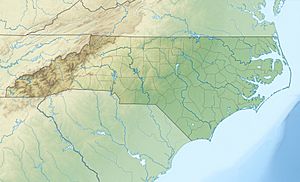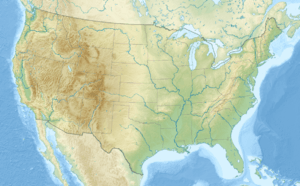Little Troublesome Creek (Haw River tributary) facts for kids
Quick facts for kids Little Troublesome Creek |
|
|---|---|
|
Location of Little Troublesome Creek mouth
|
|
| Other name(s) | Tributary to Haw River |
| Country | United States |
| State | North Carolina |
| County | Rockingham |
| City | Reidsville |
| Physical characteristics | |
| Main source | divide between Little Troublesome Creek and Troublesome Creek pond in Reidsville, North Carolina 810 ft (250 m) 36°20′54″N 079°41′49″W / 36.34833°N 79.69694°W |
| River mouth | Haw River about 1 mile southwest of Williamsburg, North Carolina 650 ft (200 m) 36°16′11″N 079°36′29″W / 36.26972°N 79.60806°W |
| Length | 8.26 mi (13.29 km) |
| Basin features | |
| Progression | southeast |
| River system | Haw River |
| Basin size | 13.00 square miles (33.7 km2) |
| Tributaries |
|
| Bridges | Freeway Drive (NC 87/US 158), Sherwood Drive, Richardson Drive, S. Park Drive, S. Scales Street, Freeway Drive (NC 87),US 29, Cook Florist Road, Mizpah Church Road |
Little Troublesome Creek is a small stream in Rockingham County, North Carolina. It is about 8.26 mi (13.29 km) long. This creek flows into the Haw River, making it a "tributary." A tributary is a smaller stream or river that flows into a larger one.
Where Does the Creek Flow?
Little Troublesome Creek begins in a pond located in Reidsville, North Carolina. This starting point is on a natural high ground that separates the water flowing into Little Troublesome Creek from the water flowing into another stream called Troublesome Creek.
From its source, Little Troublesome Creek travels southeast. It continues its journey until it joins the Haw River. This meeting point is about 1 mile southwest of a place called Williamsburg, North Carolina.
Understanding the Creek's Watershed
A watershed is like a giant bowl or basin. It's an area of land where all the water, from rain or melting snow, drains into a common point, such as a river, lake, or ocean.
The Little Troublesome Creek watershed covers an area of about 13.00 square miles (33.7 km2). This means that all the rain and water that falls within this 13-square-mile area will eventually flow into Little Troublesome Creek. On average, this area gets about 46.7 inches of rain each year. About 33% of the land in this watershed is covered by forests.
 | Tommie Smith |
 | Simone Manuel |
 | Shani Davis |
 | Simone Biles |
 | Alice Coachman |



